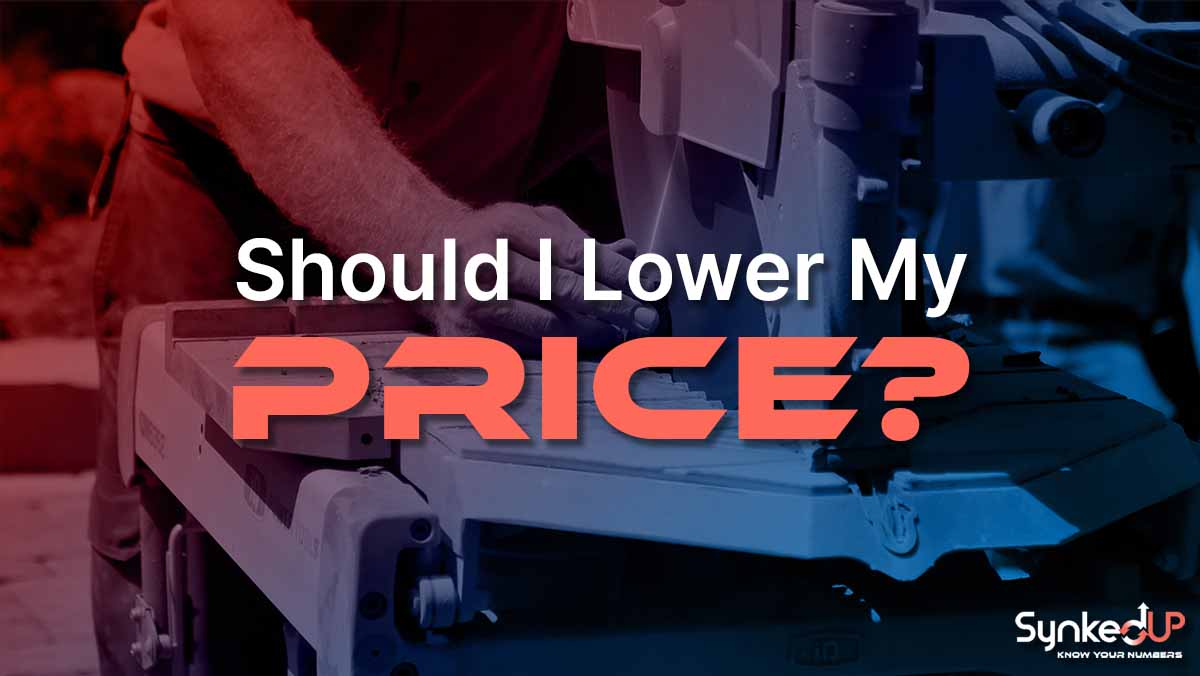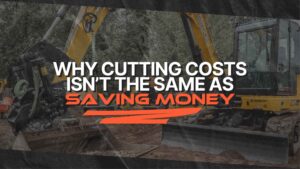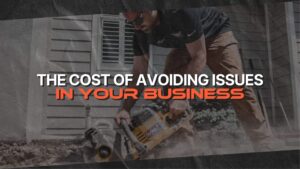If I Get a "No", Should I Lower My Price?

Is charging less the answer?
Hey, I am getting a lot of No’s for hardscape jobs for this spring since we started bidding jobs through SynkedUP. What should I do? Should I go back to $55.00 an Hour and make my markup less? Let me know what you think. Or do we just have a lot of people that are just not bidding correctly as I was before SynkedUP? Give me your personal opinion.
Here’s my reply:
But before you go whacking off your price to win the job, let’s look at a couple of things.
The market dictates your “ceiling”.
The issue is usually not the price anyway
Why?
We were competing on things other than price:
- Being the easiest to do business with.
- Responding promptly.
- Having the most 5-star reviews.
- Having the most high-quality product.
- Maintaining the best client experience.
- Having the most professional crew.
But to sell to those customers, at double the price of our competitors, we had to do a really good job filtering our leads. There are many many people that want what you do but frankly can’t afford it.
Don’t waste your time
We filtered them out by charging a consultation fee, to make sure they were serious. And we also made them fill out the Project Planner on Tussey’s site, to make sure they understood what things cost.
Once they did those things, we knew they wanted what we sold, and were able to pay for it.
- filtering your leads?
- educating your leads as to what things cost? (Put pricing ranges on your website…)
- connecting to what the customer REALLY wants on the sales call?
- going and quoting jobs for people that will never be able to afford what you do?

Weston Zimmerman
CEO and co-founder
See SynkedUP in action
Related Articles
What is the Most Difficult Challenge You’ve Overcome?
Cutting costs isn't the same as saving money. Learn how to use leverage, not panic, to drive real profit and...
Why Time Tracking is Critical for Contractors
Cutting costs isn't the same as saving money. Learn how to use leverage, not panic, to drive real profit and...
Why Cutting Costs Isn’t the Same as Saving Money
Cutting costs isn't the same as saving money. Learn how to use leverage, not panic, to drive real profit and...
Slow Down to Speed Up
A quick leadership gut check: Are you building what really matters? Slow down, realign, and lead with intention.
The One Calculation Every Contractor Should Know
Contractors: If you’re not factoring in overhead, you're not pricing right. Learn how to calculate breakeven and stop guessing your...
What Owns Your Day? Urgency or Importance?
Stuck in a cycle of chaos and urgent tasks? Break the cycle with better systems, clear processes, and leadership that...
Taking Care of Your Team
Leadership isn't barking orders - it's listening, appreciating, and building problem solvers. Here's how to lead without burning out.
The Cost of Avoiding Issues in Your Business
Avoiding stuff in business adds up, with interest. Don't try harder, build systems that make success default. Do hard things,...
Leveraging Your Job Data for More Accurate Estimates
Stop estimating from the gut. Track time, collect job data, and turn it into faster, more accurate production rates.
How the Best Contractors Ensure Profitability
Running over estimated hours is one of the biggest silent profit killers in contracting. Here's how to track it, catch...










14 Responses
Great write up
I’ve just started the program and I have had this same experience with customers.
Thank you for the knowledge
ABL “always be learning”
ABL, I love that! Good luck with your SynkedUP implementation brother, let me know if you need anything
Come with the mentality of being a buyer’s agent. You’re not selling them something they don’t want, you’re helping them get exactly what they will enjoy. You’ve got to build a relationship, ask a bunch of questions, and passionately want what’s best for the client.
Help them buy how they buy. It’s a mindset. I know I won’t be hiring our company at full price to build me anything this year. It’s not in our personal budget. But my budget isn’t their budget, my thoughts on debt aren’t their thoughts on debt.
Sell like you’re independently wealthy. I heard that all the time and didn’t understand it. If you sell like you’re starving, people smell the “blood in the water”, their “shark fin” comes out, and then they’re looking for a deal. Tell yourself, “Jeff says I have to sell to bring in 2800/day before materials” until you believe it. Work to be worth it with communication, quality and processes. I believe you can be worth more than $2800/day.
“it’s mindset…” Yep, you’re right. We’re our own worst enemy. Best tool I’ve seen to overcome this battle as a contractor is when you know exactly what your breakeven is on that bid, removes the temptation to self sabotage.
This is great advice. I went on a job walk a few days ago. It’s a new build house and it’s very obvious the owner has money. I signed a contract for the landscaping design plan with a budget of 100k. I also bid on a retaining wall that I told her was going to be outside the 100k and she agreed. The wall came out at 47k and she said it was out of her budget. I lowered the price a small amount and she still said it was to much. So I thought that’s fine because I don’t want to do it for any less and the builder needed it done asap which I can’t do it asap anyway. So now I need to draw up some plans for the summer with a 100k budget. I’m not willing to lower my prices anymore just to get work. I would rather have less jobs lined up and make money then lots of jobs lined up and barely scaping by.
💯 Justin. We can’t let ourselves get all emotionally tangled up in *needing* to win that job. Congrats on the way you handled that.
I think when proposing a bid, part of what you are selling is yourself. Lawn and landscape can be highly unregulated in many areas. Very few have business licenses. Insurance isn’t a requirement. Explain the process of the scope of work. Explain the systems you have in place to insure consistent performance of your crews. Don’t be afraid to ask about their budget. The response is an easy I dictator of can they really afford it or are they really willing to pay for it.
Yep, know your target customer, and kindly bow out when your non target customer requests your services
Getting a “no” is a win in my book, and the sooner I get it, the better, so I can move on to more important things.
Exactly. Abundance vs scarcity mindset
Great Read!! Last year my labor rate was around $65/hr. After re- doing our budget this year with some company changes. My new labor rate was $103/ man hour. When I saw that my jaw dropped to the floor thinking about the jobs I had to sell. I had some trepidation starting this season. Despite my worries, the projects are starting to fill up the schedule for our season. And we have just kept on doing a lot of the bullet points listed in Weston’s post, like we have in the past. It’s an experience not a number for the customer. I use to worry about the bottom number for the customer. Now when I write my bids I found my self adding more work areas and more options for customers to chose from and less concerned about the the total project cost. Thanks Weston!
That’s how it’s done! Kudos for pushing through the trepidation
I love your Response Weston. And it all makes perfect sense. And I would def look at many things that you listed before I assumed the $$ is getting the NO.
But also know that all areas are not created equally. And some areas are more saturated with low value contractor that do not know their numbers at all and do work very cheap. And not a large volume of qualified clients.
So.. the one thing I would add- is that Each business really needs to take a close look at what they have to offer (experience/niche) and where (years in business) they are at with their business as well. Depending on years of experience, reputation, branding, etc. in your area of work can have a big impact IMO on the clients you are able to attract and $$ you are able to charge.
E.g.- If it’s a 1–5-year company. Sometimes you have to look at getting things done with at lower budget, and waiting to buy certain pieces of equipment, etc. Or getting creative with lowering the budget, renting equipment as needed, owner working more hrs., etc. until you can build your portfolio and reputation.
I agree Chris. You added some great suggestions. The beauty of having a budget is you can go model those things out that you suggested in your budget, and see what impact it has on your pricing.